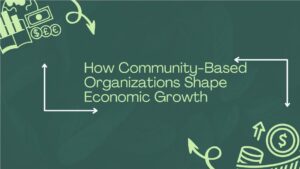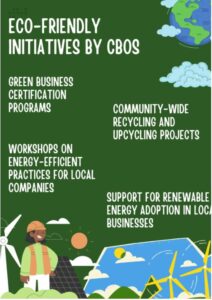Community-based organizations (CBOs) are the unsung heroes of local economic development. These grassroots entities, deeply embedded in their communities, play a pivotal role in driving economic growth and fostering prosperity. As a community member, you might wonder how these organizations contribute to your area’s economic vitality.

Image Source: Canva
Let’s delve into the multifaceted ways CBOs shape and enhance economic growth.
Strategic Roles in Economic Development
CBOs serve as powerful catalysts for local entrepreneurship, providing crucial support to startups and small businesses. Small businesses account for a staggering 44% of U.S. economic activity, underscoring the critical role CBOs play in nurturing these economic engines. By offering mentorship programs, business planning assistance, and networking opportunities, CBOs help you transform your business ideas into thriving ventures.
Access to capital is often a significant hurdle for new and growing businesses. CBOs address this challenge by:
- Connecting entrepreneurs with local investors
- Offering microloans for small business grants
- Providing guidance on securing traditional bank loans
- Organizing crowdfunding campaigns for promising local ventures
These efforts create a more robust financial ecosystem, enabling more businesses to start and scale within your community.
Workforce development is another critical area where CBOs excel. They offer a wide array of training programs and educational workshops to enhance your skills and those of your fellow community members.
This upskilling initiative helps create a more competitive local workforce, attracting businesses and fostering economic growth. CBOs offer digital literacy classes. They also offer specialized trade skills training. They ensure that your community’s workforce stays adaptable and in-demand.
Enhancing Social Infrastructure
CBOs are masters at building networks and partnerships that drive economic projects. Research indicates that effective cross-sector collaboration can lead to a 20% increase in the success rate of community development projects. By strengthening community ties, CBOs indirectly boost economic activities.
When individuals feel connected to their community, they are more likely to shop locally, support neighborhood businesses, and invest in local initiatives. This principle holds true in cities such as Boise, where the community’s strong connection has increased the demand for accessible financial resources.
In Boise, the demand for accessible financial resources continues to rise as local businesses seek opportunities for expansion. Access to loans from institutions such as credit unions is crucial, enabling these businesses to thrive by providing the necessary capital for growth and innovation. This support is particularly important in fostering a robust economic environment where small enterprises can flourish. Engaging with a Boise credit union can be a strategic move to secure financial stability and propel economic development in the region.
Sustainable Development Practices
Green initiatives are increasingly important. CBOs promote sustainable practices in local businesses and developments, helping your community stay competitive and environmentally responsible.

Image Source: Canva
A report from the Environmental Protection Agency (EPA) shows that community-led green initiatives can reduce local carbon emissions by up to 30%, demonstrating the significant impact of these efforts.
Resilience building is another key focus of CBOs. They run programs to prepare your community for economic downturns and natural disasters, ensuring long-term economic stability. This might include creating emergency funds for local businesses, developing disaster response plans, or organizing community-wide preparedness drills.
Long-term economic planning is essential for sustainable growth. CBOs conduct strategic visioning and planning sessions, involving community members like you in shaping the economic future of your area.
By taking a long-term view, CBOs help ensure that economic growth is sustainable and aligned with the community’s values and aspirations.
Measuring Impact and Success
To ensure their efforts are effective, CBOs use various metrics and benchmarks to measure economic impact and growth. This data-driven approach helps them refine their strategies and demonstrate value to stakeholders like you.
Common metrics include: the number of new businesses started, jobs created or kept, increase in local tax revenue, lower unemployment rates, and growth in median household income. Case studies of successful CBOs provide valuable insights into what works in economic development.
These real-world examples can inspire and guide other communities in their growth efforts, creating a network of knowledge and best practices that benefit communities nationwide.
CBOs value your feedback and use it to continuously improve their economic programs. Your input helps shape the initiatives that drive your community’s economic future.
Addressing Economic Inequities
CBOs are instrumental in providing targeted support for underserved populations. The National Community Reinvestment Coalition (NCRC) found that targeted community investment can increase local employment rates by up to 10% in underserved areas.
This statistic underscores the impact of CBOs. They run special programs to uplift marginalized groups in your community and ensure inclusive economic growth.
These initiatives might include:
- Job training programs for long-term unemployed individuals
- Business development support for minority-owned enterprises
- Financial literacy workshops for low-income families
- Affordable housing initiatives to support workforce stability
CBOs work tirelessly to bridge the gap in economic opportunities. Their initiatives aim to equalize access to economic resources and opportunities for all community members, creating a more inclusive and equitable local economy.
Community-led revitalization projects are a hallmark of CBO efforts. Many economically depressed areas have been transformed through the dedicated work of these organizations, breathing new life into struggling neighborhoods.
CBOs drive real, visible changes in your community’s economy. They transform abandoned lots into community spaces and renovate historic buildings for new businesses.
Future Trends and Innovations
As technology evolves, so do the methods CBOs use to enhance economic development. From digital skills training to online marketplaces for local businesses, CBOs are embracing technological solutions to boost your community’s economy.
Some innovative approaches include virtual reality training programs for workforce development, blockchain-based local currencies to encourage local spending, AI-powered tools for economic forecasting and planning, and smart city initiatives to improve infrastructure and attract businesses.
The role of CBOs in economic growth is expected to evolve over the next decade. Predictions suggest they may become even more integral to local economic planning and execution, potentially taking on roles traditionally held by government agencies or private sector entities.
Wrap Up
Innovative funding models are emerging that CBOs can leverage to support their initiatives. Crowdfunding, impact investing, and social enterprise models are just a few ways these organizations are diversifying their financial support.
These new funding streams let CBOs expand. They can reach more people and have more impact. They can take on larger and more complex economic projects.
Get involved with your local CBOs today. Volunteer your time, share your skills, or support their initiatives financially.
Your participation can make a real difference in shaping your community’s economic future. Together, we can build thriving, resilient local economies that provide opportunities for all.
FAQs
1. How can I find CBOs working on economic development in my area?
Contact your local government or chamber of commerce for a list of active CBOs in your community focusing on economic growth.
2. What skills do CBOs typically look for in volunteers?
CBOs value a wide range of skills, including business expertise, grant writing, marketing, and event planning. Your unique talents can likely benefit a local CBO.
3. How do CBOs measure their impact on local economic growth?
CBOs often track metrics such as job creation, business start-ups, income growth, and community engagement to measure their economic impact.





